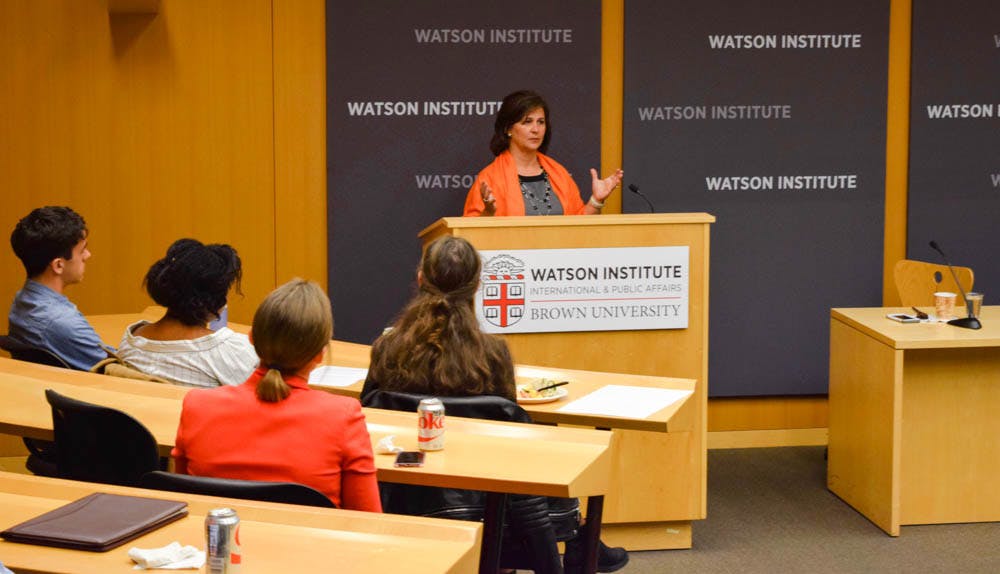Rhode Island Secretary of State Nellie Gorbea delivered a speech on voting policy and practice in Rhode Island at the Joukowsky Forum Monday. The lecture was the first hosted by Women, Empowered, a new student group funded by the Watson Institute for International and Public Affairs.
Gorbea, a Puerto Rico native, became the first Hispanic to hold statewide office in New England when she was elected in 2015. In her talk, Gorbea highlighted the path that led her to the Ocean State.
In her free time, she became involved in local community groups and was quickly appointed to leadership positions. She served as deputy secretary of state before running for secretary of state in 2015. “I am having a blast being your secretary of state here in Rhode Island,” Gorbea said.
Many of Gorbea’s achievements in her first year in office have involved voting, one of the main responsibilities of the Rhode Island Department of State. She has procured new voting machines for all polling places, instituted electronic poll votes and created an online voter registration system.
Gorbea said that one of her goals is to implement automatic voter registration. “If the state knows that you’re a citizen … why do we have to ask you if you want to register to vote?” she said. She believes automatic voter registration will enhance ongoing voter education efforts and make the broader process of voting more accessible. Establishing an online voter registration system was a necessary first step because “you can’t do all the change at once,” Gorbea said.
Gorbea underscored the importance of voting as a crucial way for citizens to make political change. “You will definitely not change anything if you stay home. But you might change something if you go and vote,” she said.
Gorbea said she would support an effort to overturn Rhode Island’s voter ID laws — which make it harder for young people, the elderly and people of color, especially in lower income brackets, to vote — but did not plan to propose this reversal herself. Instead of tackling the legislation, Gorbea said she decided “to work on things that actually open up voting for a broader number of people and hopefully get higher numbers of people to participate,” such as education and outreach campaigns.
She also discussed the importance of women becoming involved in politics. She said a review of Rhode Island’s budget through a gendered lens showed that rollbacks on tax credits significantly impacted the types of households likely to be headed by women while not affecting those that are often male-headed. “We need more women at the policy table,” Gorbea concluded.
The fact that childcare is being discussed for the first time as a key issue this presidential election —the first one with a woman leading a major party ticket — is a testament to the claim that “as you see more women in public policy, you see different agenda items,” Gorbea added.
Political organizations and events are often structured in a way that makes it hard for women to participate, Gorbea said. But she added, “if the structure doesn’t work for you, then don’t try to adhere to it. Make it up in a way that works for you.”
“Sometimes, the barriers we face — the worst ones are inside our heads,” she said.
She also applauded Women, Empowered for fostering a space at Brown to discuss issues affecting women in politics, saying “we need to create safe zones to have these conversations.” Later, she added that while these safe zones create important, necessary spaces, it is very important “to also reach out and listen to those who you don’t agree with and are saying things that are really bothering you,” as doing so helps people meet their goals.
Shavon Bell ’17, co-founder of Women, Empowered and a former Herald senior staff writer, said that she enjoyed hearing about the important issue of voting separated from the drama of the presidential election. Along with co-founder Lucrezia Sanes ’17, she emphasized the importance of hearing from intersectional voices in politics. She noted that Gorbea holds a “landmark historical position in Rhode Island history.”
Sanes touted Gorbea’s drive to get involved in government and issues that she found important as a model. “If you see a problem, get involved. There are so many professors and so many resources at Brown for you to get involved and actually make solutions to problems that you see happen,” she said.





